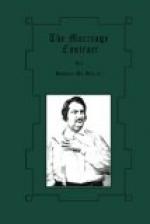The subject of this Study is not the transition of a bachelor into a married man,—a picture which, if broadly composed, would not lack the attraction which the inner struggles of our nature and feelings give to the commonest situations in life. The events and the ideas which led to the marriage of Paul with Natalie Evangelista are an introduction to our real subject, which is to sketch the great comedy that precedes, in France, all conjugal pairing. This Scene, until now singularly neglected by our dramatic authors, although it offers novel resources to their wit, controlled Paul’s future life and was now awaited by Madame Evangelista with feelings of terror. We mean the discussion which takes place on the subject of the marriage contract in all families, whether noble or bourgeois, for human passions are as keenly excited by small interests as by large ones. These comedies, played before a notary, all resemble, more or less, the one we shall now relate, the interest of which will be far less in the pages of this book than in the memories of married persons.
CHAPTER III
THE MARRIAGE CONTRACT—FIRST DAY
At the beginning of the winter of 1822, Paul de Manerville made a formal request, through his great-aunt, the Baronne de Maulincour, for the hand of Mademoiselle Natalie Evangelista. Though the baroness never stayed more than two months in Medoc, she remained on this occasion till the last of October, in order to assist her nephew through the affair and play the part of a mother to him. After conveying the first suggestions to Madame Evangelista the experienced old woman returned to inform Paul of the results of the overture.
“My child,” she said, “the affair is won. In talking of property, I found that Madame Evangelista gives nothing of her own to her daughter. Mademoiselle Natalie’s dowry is her patrimony. Marry her, my dear boy. Men who have a name and an estate to transmit, a family to continue, must, sooner or later, end in marriage. I wish I could see my dear Auguste taking that course. You can now carry on the marriage without me; I have nothing to give you but my blessing, and women as old as I are out of place at a wedding. I leave for Paris to-morrow. When you present your wife in society I shall be able to see her and assist her far more to the purpose than now. If you had had no house in Paris I would gladly have arranged the second floor of mine for you.”
“Dear aunt,” said Paul, “I thank you heartily. But what do you mean when you say that the mother gives nothing of her own, and that the daughter’s dowry is her patrimony?”
“The mother, my dear boy, is a sly cat, who takes advantage of her daughter’s beauty to impose conditions and allow you only that which she cannot prevent you from having; namely, the daughter’s fortune from her father. We old people know the importance of inquiring closely, What has he? What has she? I advise you therefore to give particular instructions to your notary. The marriage contract, my dear child, is the most sacred of all duties. If your father and your mother had not made their bed properly you might now be sleeping without sheets. You will have children, they are the commonest result of marriage, and you must think of them. Consult Maitre Mathias our old notary.”




